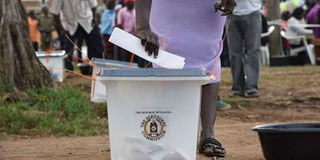Uganda’s Electoral Commission extends voting time

People cast their vote in presidential and parliamentary polls at the Nasuti polling station in Mukono District, some 23 kilometres east of the capital Kampala, on February 18, 2016. PHOTO | AFP | ISAAC KASAMANI
What you need to know:
- UCC’s director of corporate affairs Fred Otunnu said “we have switched off but only temporarily because as you know this is a very sensitive period”.
- Sources also intimated that Museveni himself, the incumbent seeking a fifth elective term in office after 30 years in power, had also raised an alarm.
Mobile phone users subscribing to MTN and Airtel, networks that command a large following, were the most affected.
KAMPALA, UGANDA
Uganda Electoral Commission Chairman Badru Kiggundu has extended the deadline for voters to turn up at polling stations from 4pm to 7pm.
He says the extension has been prompted by the electoral body's earlier delay in delivering voting materials to various polling stations across the country.
Section 50 of the Electoral Commission Act grants the electoral body the right to extend voting time.
Voters in Kampala and Wakiso districts, according to the EC, should proceed to vote.
PROTEST
Earlier Thursday, Ugandan police fired tear gas to disperse furious voters in the capital Kampala as the election commission apologised for hours-long delays in delivering ballot papers, AFP reporters said.
Voting was due to begin at 7am but was stalled for several hours in some polling stations in the city and surrounding Wakiso district when ballot boxes and papers did not arrive on time.
The capital traditionally shows strong support for the opposition.
"There has been a delay in delivery of polling materials in some parts of Wakiso district and Kampala capital city. The Electoral Commission regrets the delay," the commission said in a statement.
"The polling materials have now been delivered to all these places and polling has commenced in most of the places," the statement added.
Ugandan authorities also blocked social media platforms and mobile money networks as voting in the general elections got under way.
The Uganda Communications Commission (UCC) said access to social media platforms like WhatsApp and Facebook via mobile phones and the popular mobile money network had been temporarily blocked over “national security” concerns during the election period.
UCC’s director of corporate affairs Fred Otunnu said “we have switched off but only temporarily because as you know this is a very sensitive period”.
WhatsApp, a popular instant messaging service owned by Facebook, was shut down as early as 9am and was closely followed by mobile Facebook.
Sources, however, indicated the shutdown was ordered by top officials in the ruling party NRM and the military to control the avalanche of negative messages — word, audio and video — circulating on the platforms campaigning against President Yoweri Museveni.
Sources also intimated that Museveni himself, the incumbent seeking a fifth elective term in office after 30 years in power, had also raised an alarm.
WhatsApp is a popular cross-message platform that can be accessed by everyone using a smartphone.
It allows Internet-enabled users to send text messages, images, video, user location and audio media messages to other users.
Mobile phone users subscribing to MTN and Airtel, networks that command a large following, were the most affected.
MTN indicated in advance Wednesday that its Mobile Money network would be off for some time.
INTERMITTENT NETWORK
Access to the social media platforms via Africell also remained intermittent. It is only access via the Vodafone network that remained active.
Being Internet-enabled, social media platforms can be tampered with or blocked by governments.
Last year, for example, a judge in Brazil ordered the switch-off of WhatsApp for 48 hours after Facebook turned down the government’s request to eavesdrop on users' messages.
The Ugandan government has also on several occasions logged requests to Facebook for some user information, which have been turned down.
Voting across the country started as early 7am and will close at 6pm.
Besides Museveni, other top candidates in the race include FDC’s Kizza Besigye, a four-time presidential aspirant, and former prime minister Amama Mbabazi.



